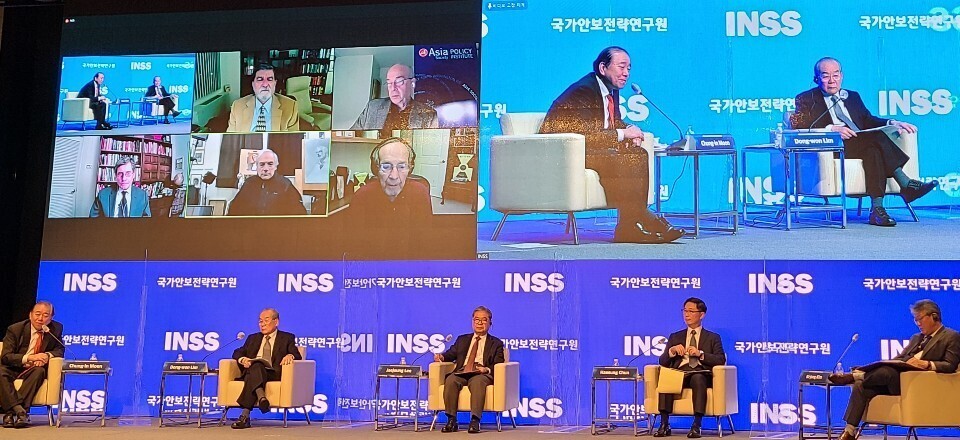hankyoreh
Links to other country sites 다른 나라 사이트 링크
S. Korean, US experts say Washington needs to guarantee regime security and normalize relations with Pyongyang to progress in denuclearization negotiations

Former senior South Korean and US officials experienced in negotiations with North Korea suggest that the incoming Joe Biden administration will need to guarantee the security of North Korea’s regime and normalize relations with Pyongyang in order to resolve the denuclearization issue.
Former South Korean Unification Minister Lim Dong-won, former US State Department North Korea policy advisor William Perry, and former State Department Special Envoy Robert Gallucci shared this position in a video conference jointly held between Seoul and Washington by the Institute for National Security Strategy (INSS) and the Stanford University’s Center for International Security and Cooperation (CISAC) on Dec. 2.
Positions on the prospect of North Korea’s complete denuclearization were generally pessimistic on the US side, while the South Korean side indicated that it would be “difficult but achievable.” Gallucci, a key figure behind the 1994 US-North Korea Agreed Framework in Geneva, commented that 90% of Washington does not believe North Korea will give up its nuclear weapons. Perry added that getting North Korea to give up its nuclear program was close to a “mission impossible,” suggesting that “normalizing” North Korea as a state represented a more practical policy aim than complete denuclearization.
In contrast, Lim said he believed the North Korean nuclear issue was “solvable.” Special Presidential Advisor for Unification, Foreign Affairs and National Security Moon Chung-in, who served as moderator, also said that “diplomatic negotiations, not a military response, represent our only option.”
“We need to achieve optimistic outcomes out of pessimistic prospects through policy coordination between South Korea and the US,” he urged.
Even the figures representing the US side did not rule out the possibility of a change in attitude from Pyongyang. Gallucci shared his own experience with being surprised at how the North would back off from its previous adamant refusal to do something when a give-and-take situation arose.
Agreeing that North Korea regards nuclear weapons as a means of deterring a potential military strike by the US, the South Korean and US veteran officials advised that the Biden administration should work under this assumption as it goes about trying to find a solution. Perry argued that North Korea wants economic development but will not exchange its nuclear weapons for it, advising that any negotiator would have to be able to offer some means of guaranteeing its security.
Lim called the North Korean nuclear issue a “product of the hostile relationship between North Korea and the US.”
“If we hope to resolve the North Korean nuclear issue, we also need to think about whether the US is really willing to normalize relations and guarantee peace on the Korean Peninsula,” he stressed, adding that it was “not realistic to focus on North Korea’s position alone.”
He went on to say, “I think the issue can be resolved if the Biden administration adopts an upgraded version of the [Bill] Clinton-Perry give-and-take approach, for example through a step-by-step, simultaneous approach that involves improving hostile relations and guaranteeing an environment where nuclear weapons are not necessary in exchange for denuclearization.” Former Vice Minister of Unification Chun Hae-sung called for “preemptive engagement with North Korea based on an appropriate division of roles and coordination between South Korea and the US.”
Former Assistant Secretary of State for East Asian and Pacific Affairs Daniel Russel, who was closely involved in an agreement reached between Pyongyang and Washington during the Barack Obama administration on Feb. 29, 2012, urged the Biden administration to adopt a combination of clearly agreed-upon negotiation priorities, coordination with South Korea, and support from China. Joseph DeTrani, a State Department special envoy to the Six-Party Talks during the George W. Bush administration, advised the US to avoid playing games that use North Korea as leverage in its relations with China.
By Lee Je-hun, senior staff writer
Please direct comments or questions to [english@hani.co.kr]

Editorial・opinion
![[Column] Season 2 of special prosecutor probe may be coming to Korea soon [Column] Season 2 of special prosecutor probe may be coming to Korea soon](https://flexible.img.hani.co.kr/flexible/normal/500/300/imgdb/original/2024/0426/3317141030699447.jpg) [Column] Season 2 of special prosecutor probe may be coming to Korea soon
[Column] Season 2 of special prosecutor probe may be coming to Korea soon![[Column] Park Geun-hye déjà vu in Yoon Suk-yeol [Column] Park Geun-hye déjà vu in Yoon Suk-yeol](https://flexible.img.hani.co.kr/flexible/normal/500/300/imgdb/original/2024/0424/651713945113788.jpg) [Column] Park Geun-hye déjà vu in Yoon Suk-yeol
[Column] Park Geun-hye déjà vu in Yoon Suk-yeol- [Editorial] New weight of N. Korea’s nuclear threats makes dialogue all the more urgent
- [Guest essay] The real reason Korea’s new right wants to dub Rhee a founding father
- [Column] ‘Choson’: Is it time we start referring to N. Korea in its own terms?
- [Editorial] Japan’s rewriting of history with Korea has gone too far
- [Column] The president’s questionable capacity for dialogue
- [Column] Are chaebol firms just pizza pies for families to divvy up as they please?
- [Column] Has Korea, too, crossed the Rubicon on China?
- [Correspondent’s column] In Japan’s alliance with US, echoes of its past alliances with UK
Most viewed articles
- 1Is Japan about to snatch control of Line messenger from Korea’s Naver?
- 2‘We must say no’: Seoul defense chief on Korean, USFK involvement in hypothetical Taiwan crisis
- 3Up-and-coming Indonesian group StarBe spills what it learned during K-pop training in Seoul
- 4[News analysis] Using lure of fame, K-entertainment agency bigwigs sexually prey on young trainees
- 5[Column] Park Geun-hye déjà vu in Yoon Suk-yeol
- 6Is N. Korea threatening to test nukes in response to possible new US-led sanctions body?
- 7Division commander ordered troops to enter raging flood waters before Marine died, survivor says
- 8S. Korea “monitoring developments” after report of secret Chinese police station in Seoul
- 9Will NewJeans end up collateral damage in internal feud at K-pop juggernaut Hybe?
- 10Report reveals toxic pollution at numerous USFK bases